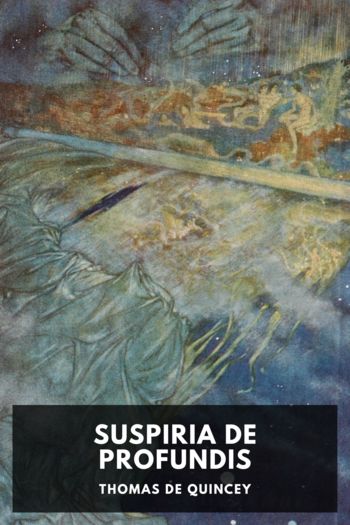Suspiria de Profundis by Thomas De Quincey (urban books to read .TXT) 📕

- Author: Thomas De Quincey
Book online «Suspiria de Profundis by Thomas De Quincey (urban books to read .TXT) 📕». Author Thomas De Quincey
Ah, reader! when I look back upon those days, it seems to me that all things change—all things perish. “Perish the roses and the palms of kings”: perish even the crowns and trophies of Waterloo: thunder and lightning are not the thunder and lightning which I remember. Roses are degenerating. The Fannies of our island—though this I say with reluctance—are not visibly improving; and the Bath road is notoriously superannuated. Crocodiles, you will say, are stationary. Mr. Waterton tells me that the crocodile does not change—that a cayman, in fact, or an alligator, is just as good for riding upon as he was in the time of the Pharaohs. That may be; but the reason is that the crocodile does not live fast—he is a slow coach. I believe it is generally understood among naturalists that the crocodile is a blockhead. It is my own impression that the Pharaohs were also blockheads. Now, as the Pharaohs and the crocodile domineered over Egyptian society, this accounts for a singular mistake that prevailed through innumerable generations on the Nile. The crocodile made the ridiculous blunder of supposing man to be meant chiefly for his own eating. Man, taking a different view of the subject, naturally met that mistake by another: he viewed the crocodile as a thing sometimes to worship, but always to run away from. And this continued till Mr. Waterton29 changed the relations between the animals. The mode of escaping from the reptile he showed to be not by running away, but by leaping on its back booted and spurred. The two animals had misunderstood each other. The use of the crocodile has now been cleared up—viz., to be ridden; and the final cause of man is that he may improve the health of the crocodile by riding him a-fox-hunting before breakfast. And it is pretty certain that any crocodile who has been regularly hunted through the season, and is master of the weight he carries, will take a six-barred gate now as well as ever he would have done in the infancy of the pyramids.
If, therefore, the crocodile does not change, all things else undeniably do: even the shadow of the pyramids grows less. And often the restoration in vision of Fanny and the Bath road makes me too pathetically sensible of that truth. Out of the darkness, if I happen to call back the image of Fanny, up rises suddenly from a gulf of forty years a rose in June; or, if I think for an instant of the rose in June, up rises the heavenly face of Fanny. One after the other, like the antiphonies in the choral service, rise Fanny and the rose in June, then back again the rose in June and Fanny. Then come both together, as in a chorus—roses and Fannies, Fannies and roses, without end, thick as blossoms in paradise. Then comes a venerable crocodile, in a royal livery of scarlet and gold, with sixteen capes; and the crocodile is driving four-in-hand from the box of the Bath mail. And suddenly we upon the mail are pulled up by a mighty dial, sculptured with the hours, that mingle with the heavens and the heavenly host. Then all at once we are arrived at Marlborough forest, amongst the lovely households30 of the roe-deer; the deer and their fawns retire into the dewy thickets; the thickets are rich with roses; once again the roses call up the sweet countenance of Fanny; and she, being the granddaughter of a crocodile, awakens a dreadful host of semi-legendary animals—griffins, dragons, basilisks, sphinxes—till at length the whole vision of fighting images crowds into one towering armorial shield, a vast emblazonry of human charities and human loveliness that have perished, but quartered heraldically with unutterable and demoniac natures, whilst over all rises, as a surmounting crest, one fair female hand, with the forefinger pointing, in sweet, sorrowful admonition, upwards to heaven, where is sculptured the eternal writing which proclaims the frailty of Earth and her children.
Going Down with VictoryBut the grandest chapter of our experience within the whole mail-coach service was on those occasions when we went down from London with the news of victory. A period of about ten years stretched from Trafalgar to Waterloo; the second and third years of which period (1806 and 1807) were comparatively sterile; but the other nine (from 1805 to 1815 inclusively) furnished a long succession of victories, the least of which, in such a contest of Titans, had an inappreciable value of position: partly for its absolute interference with the plans of our enemy, but still more from its keeping alive through central Europe the sense of a deep-seated vulnerability in France. Even





Comments (0)